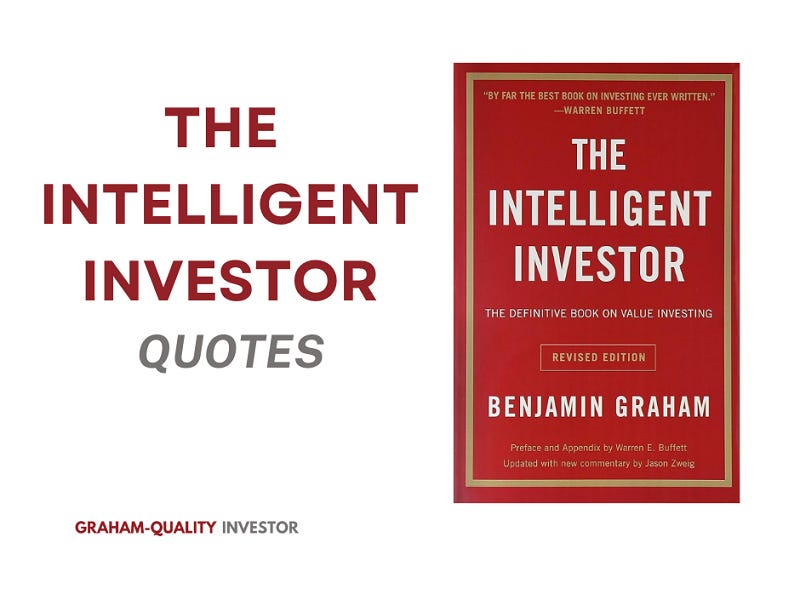12 Quotes from Benjamin Graham's The Intelligent Investor
This post explores key quotes from Benjamin Graham's classic book, The Intelligent Investor.
This post delves into the profound insights and timeless principles from Benjamin Graham's seminal work, The Intelligent Investor. Known as the father of value investing, Graham's book, first published in 1949 and updated with contributions from Jason Zweig, provides a comprehensive framework for making sound investment decisions.
Throughout this post, you will explore key quotes from The Intelligent Investor that highlight Graham's essential teachings on distinguishing between investing and speculating, understanding the importance of investor psychology, recognizing the pitfalls of "hot" stocks and IPOs, applying the concept of the margin of safety, and many more lessons.
TL; DR
Investing vs. Speculating: An investment operation ensures safety of principal and an adequate return through thorough analysis. Speculative operations don't meet these criteria and should not be mingled with investments.
Beware of “hot” stocks: Stocks that are rapidly gaining popularity tend to fall just as quickly.
Beware of Mr. Market: Day-to-day market fluctuations should not dictate an investor’s perception of wealth. Price movements offer buying and selling opportunities but should otherwise be ignored.
Invest like a businessman: Investment is most effective when approached with the same principles as a business. Investors should view securities as ownership interests in businesses and apply sound business principles.
Investing vs. Speculating
An investment operation is one which, upon thorough analysis promises safety of principal and an adequate return. Operations not meeting these requirements are speculative.
Never mingle your speculative and investment operations in the same account, nor in any part of your thinking.
Beware of “hot” stocks
The hotter they are (stocks), the harder they fall.
Beware of IPOs
Somewhere in the middle of the bull market the first common-stock flotations make their appearance. These are priced not unattractively, and some large profits are made by the buyers of the early issues. As the market rise continues, this brand of financing grows more frequent; the quality of the companies becomes steadily poorer; the prices asked and obtained verge on the exorbitant. One fairly dependable sign of the approaching end of a bull swing is the fact that new common stocks of small and nondescript companies are offered at prices somewhat higher than the current level for many medium-sized companies with a long market history
An elementary requirement for the intelligent investor is an ability to resist the blandishments of salesmen offering new common stock issues during bull markets. It is easy money. For every dollar you make in this way you will be lucky if you end up by losing only two. Some of these issues may prove excellent buys—a few years later, when nobody wants them and they can be had at a small fraction of their true worth.
On growth stocks
Common stocks with good records and apparently good prospects sell at correspondingly high prices. The investor may be right in his judgment of their prospects and still not fare particularly well, merely because he has paid in full (and perhaps overpaid) for the expected prosperity.
Rapid growth cannot keep up forever; when a company has already registered a brilliant expansion, it’s very increase in size makes a repetition of its achievement more difficult. At some point the growth curve flattens out, and in many cases it turns downward.
Find bargains in depressed markets
The wisdom of having courage in depressed markets is vindicated not only by the voice of experience but also by application of plausible techniques of value analysis.
The market is fond of making mountains out of molehills and exaggerating ordinary vicissitudes into major setbacks. Even a mere lack of interest or enthusiasm may impel a price decline to absurdly low levels.
Invest like a businessman
As an investor you cannot soundly become “half a businessman,” expecting thereby to achieve half the normal rate of business profits on your funds.
Investment is most intelligent when it is most businesslike. It is amazing to see how many capable businessmen try to operate in Wall Street with complete disregard of all the sound principles through which they have gained success in their own undertakings. Yet every corporate security may best be viewed, in the first instance, as an ownership interest in, or a claim against, a specific business enterprise. And if a person sets out to make profits from security purchases and sales, he is embarking on a business venture of his own, which must be run in accordance with accepted business principles if it is to have a chance of success.
On bull markets
Nearly all the bull markets had a number of well-defined characteristics in common, such as (1) a historically high price level, (2) high price/earnings ratios, (3) low dividend yields as against bond yields, (4) much speculation on margin, and (5) many offerings of new common-stock issues of poor quality.
Beware of Mr. Market
A serious investor is not likely to believe that the day-to-day or even month-to-month fluctuations of the stock market make him richer or poorer.
Price fluctuations have only one significant meaning for the true investor. They provide him with an opportunity to buy wisely when prices fall sharply and to sell wisely when they advance a great deal. At other times he will do better if he forgets about the stock market and pays attention to his dividend returns and to the operating results of his companies.
The investor with a portfolio of sound stocks should expect their prices to fluctuate and should neither be concerned by sizable declines nor become excited by sizable advances. He should always remember that market quotations are there for his convenience, either to be taken advantage of or to be ignored. He should never buy a stock because it has gone up or sell one because it has gone down. He would not be far wrong if this motto read more simply: “Never buy a stock immediately after a substantial rise or sell one immediately after a substantial drop.”
Beware of professional advisors
The familiar combination of greed, folly, and irresponsibility has not been exorcized from the financial scene.
The intelligent investor will pay attention to the advice and recommendations received from investment banking houses, especially those known by him to have an excellent reputation; but he will be sure to bring sound and independent judgment to bear upon these suggestions—either his own, if he is competent, or that of some other type of adviser.
How to be a great investments analyst
The security analyst deals with the past, the present, and the future of any given security issue. He describes the business; he summarizes its operating results and financial position; he sets forth its strong and weak points, its possibilities and risks; he estimates its future earning power under various assumptions, or as a “best guess.” He makes elaborate comparisons of various companies, or of the same company at various times. Finally, he expresses an opinion as to the safety of the issue, if it is a bond or investment grade preferred stock, or as to its attractiveness as a purchase, if it is a common stock.
Don't overpay
The enterprising investor may confine his choice to industries and companies about which he holds an optimistic view, but we counsel strongly against paying a high price for a stock (in relation to earnings and assets) because of such enthusiasm.
On margin of safety
We say that to have a true investment there must be present a true margin of safety. And a true margin of safety is one that can be demonstrated by figures, by persuasive reasoning, and by reference to a body of actual experience.
If the price is low enough to create a substantial margin of safety, the security thereby meets our criterion of investment.
Summary
This post explores key quotes from Benjamin Graham's classic book, The Intelligent Investor, shedding light on foundational principles of value investing. Graham distinguishes between investing and speculating, emphasizing the importance of thorough analysis and the safety of principal. He warns against the allure of "hot" stocks and IPOs, highlighting their inherent risks. The post also delves into the challenges of growth stocks, noting that high prices often reflect over-optimistic expectations.
The father of value investing advocates for a businesslike approach to investing, treating securities as ownership interests in real businesses and applying sound business principles. He underscores the importance of maintaining a margin of safety to protect against potential losses, and advises investors to remain detached from market fluctuations, using them as opportunities rather than indicators of wealth.
Download this post 👇
Got a burning question or a topic you're curious about? I'd love to hear from you! Please drop a comment 💬 below or shoot me an email 📧 at grahamqualityinvestor@gmail.com







